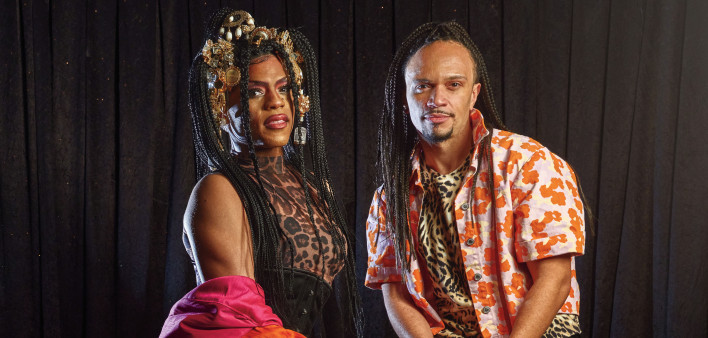Actors Darius Harper and André Jordan, both 36, first met as college students at the American Musical and Drama Academy in New York City, where almost 20 years ago they set out to become stage actors. They’ve supported each other throughout their careers and built a wonderful friendship. And now, they’re standing by each other as they navigate life with HIV.
“It’s a really amazing opportunity to share in this intimate moment with a really good friend,” says Harper about gracing the cover of this issue of POZ alongside Jordan.
Last November, Harper and Jordan performed as part of Playbill’s third annual benefit concert Remember the Ribbon: A Tribute to World AIDS Day. Harper sang a beautiful rendition of “Ribbon in the Sky” by Stevie Wonder. And Jordan kicked off the show with a powerful performance of “You Gotta Be” by Des’ree, which Jordan describes as “a song about lifting yourself up and looking toward the future and taking what life rolls at you.”

Darius Harper (right) and André JordanBill Wadman
For Jordan, who uses he/she pronouns, sharing the stage with his friend and fellow actor was very special. It was also a pivotal moment for Harper.
“Remember the Ribbon was really my coming out,” says Harper, who uses he/they pronouns. “Nobody in my career, my life or my family, except my grandma and a handful of besties, knew about my status.”
In 2015, Jordan and Harper were living out their dreams as working stage actors. Harper was starring in the national tour of the musical Kinky Boots, and Jordan was touring with the musical Joseph and the Amazing Technicolor Dreamcoat. They performed and traveled all over the United States. But both their lives unexpectedly changed that year.
While on tour, Jordan got tested for sexually transmitted infections (STIs) along with some of his castmates. He had been tested six months earlier, so he didn’t anticipate the news he received. He was HIV positive.
“It was sad,” Jordan says. “I had felt this awful stigma around it, that I had done something wrong and that I deserved this for just living my life and doing the things everybody else was.”
Jordan thought he was going to die. Despite growing up in a generation that knew about HIV and AIDS, he hadn’t realized that treatment had advanced such that people living with the virus could lead long, healthy lives. “I hadn’t even allowed myself to consider or do any research into what it’s like for people living with HIV,” he explains. “I thought, Oh, that’s not something that can happen to me.”
Jordan continued to perform and postponed going on treatment. He wanted to finish the five to six months remaining of the Joseph tour. The physician who’d informed him of his status told him that it would be OK but advised him to find a doctor and get on treatment as soon as he returned to New York. Besides, Jordan hadn’t yet worked the minimum number of weeks required for health insurance coverage by his employer. Continuing on tour would help him qualify for the coverage he needed to start treatment once he was back home.
“Luckily, I did catch it early so that I could take that time and not have to feel that I was in a worse place than I could’ve been,” Jordan says. “I was still very healthy, and I was performing.”

André JordanBill Wadman
Meanwhile, Harper was wrapping up the Kinky Boots tour, the second-to-last city of which happened to be his hometown of Boston. While there, he was preparing to head abroad for another job, but in order to travel, he needed to complete a physical. So he went to see a doctor.
“I remember I was at brunch with some friends, and I got a phone call from the doctor,” Harper says. “They wanted me to come into the office because I had gone to an urgent care center and not my primary care physician.”
Harper didn’t go. Instead, he asked to be given the news over the phone. That’s when he learned that he was HIV positive. He was in shock.
“I was in the car, and my friends were looking at me in the rearview mirror,” Harper recalls. “They were like, ‘What is wrong with you? You look like somebody just died.’ So that moment was very palpable.”
Harper tried to sweep the diagnosis under the rug. He left to perform abroad but returned home months later. It turned out that he also had syphilis, and the STI was very far along.
“That was a moment when my life kind of fell apart,” he says. “I was supposed to be working abroad and financially have enough through a yearlong contract. To cut that short to come home and deal with my diagnosis was a lot.”
When Jordan returned to New York, he looked online for HIV resources and then connected with an LGBTQ clinic in his Brooklyn neighborhood.
He met with someone who helped him find a doctor. His doctor first prescribed him three HIV drugs. These days, he manages his HIV with just two of those medications.
“I’ve been undetectable for a long time,” Jordan says. “It’s such a thing that it’s not a thing anymore. You get up every day, take a shower, pop your pills and just keep going.”
Maintaining his health requires more than just taking his HIV meds. He remains active by running and working out at the gym. As a performer, he also dances a lot. Sometimes he takes breaks from alcohol too. But what has helped him the most along his HIV journey is sharing his story with others.
“Not being afraid to talk about it publicly is a big help because I don’t I have to hide it,” he says. “I can say it freely. It’s just a part of who I am now.”
Since his diagnosis eight years ago, Jordan’s life has changed tremendously. In 2016, he met the love of his life, who is now his fiancé. They plan to get married soon and hopefully start a family. Jordan has also enjoyed some career success.
In 2015, he starred in the YouTube series The Queens Project, which ran for several seasons. Then in 2021, he made his Broadway debut in the musical Diana.
“[Debuting in Diana] was the best day of my life,” Jordan says. “It was everything I had dreamed of. It was 15 years after I had moved to the city. I felt like everything was worth it.”
Harper believes that being forced to acknowledge his status is what saved him.
“There was a lot of abuse of my body going on and a lot of mental situations that I’m in therapy today for,” he says. “All of that stuff came to the forefront. So while I was trying to save my life by getting medicine, I was also kind of laying down and dying at the same time.”
Harper credits his doctor with helping him survive. He had his syphilis treated and began HIV treatment with a once-daily pill.
“It’s really intense those first weeks, months and year of an HIV diagnosis,” he says. “There’s a lot of changes in your life routine-wise. Once you find the right medicine, you have to stay on it.”
In 2017, Harper joined a Cirque du Soleil tour in Canada. He tried having his medication delivered to the country several times, but it kept getting lost at the border. At one point, he stopped taking it altogether due to stress.
When he returned to New York, Harper had developed resistance to the medication. That’s when his doctor switched him to the daily one-pill regimen he’s still on. He is currently undetectable, which means he cannot pass on the virus sexually.
Harper’s journey hasn’t been easy. He once struggled with self-harm and substance use. But seeking help for his mental health and being in recovery have changed his life. The experience has also allowed him to open up about living with HIV.

Darius HarperBill Wadman
“I’m at a place now where all of those scabs have been healed,” Harper says. “It felt right to share my story because that’s who I am as a creative, as an artist. I always strive to be an advocate and ally for people who look like me and come from where I come from. That now includes the HIV community.”
In the past, Harper and Jordan have both struggled to maintain their health insurance coverage, which affected their treatment. As members of the Actors’ Equity Association, they must work 12 weeks to get insurance coverage for six months and work more to be eligible for the year.
“There were a lot of times in the beginning of my diagnosis where I was going without medication because of insurance issues,” Harper explains. “Whether it had lapsed or I didn’t have enough weeks worked in my work year to get it. Switching over to Medicaid was probably the best thing that I could’ve done as an HIV-positive individual.”
Jordan applied for Medicaid when he couldn’t get insurance through his job.
“I wasn’t able to get my medication,” Jordan says. “There’s been like a two-month break and a little bit longer than that sometimes. But I’m always able to get back on insurance and then back onto my medications.”
Managing HIV while on tour also has its challenges. Doing so sometimes became too much for Harper. As if touring weren’t time-consuming enough, he would also have to find time for medical visits in new cities.
“In my experience as a touring artist with HIV, there is no resource for doctors other than a new patient situation in different cities,” Harper explains. “Even if you have your medicine mailed to you from your doctor, sometimes things go awry, and you need to go into a clinic.”
That’s how Harper got the idea to develop a network across clinics in different cities for touring artists living with HIV. The network would allow union actors to visit a specific clinic in each city. The clinics would have all their files and labs saved in a system.
Jordan thinks it’s a great idea. “If you’re on the road, in a regional show or you’re on contract and this happens to you,” he says, “then you can you go around the country and seek out help without it having to put a full stop on your life.”
Until recently, Harper didn’t really think about the future, but now, he thinks about his life in the long term.

Darius Harper (left) and André JordanBill Wadman
“Before my diagnosis, I had a wonderful life,” Harper says. “I’ve had a great time on the road. But right now, I’m having fun just working my job, paying my rent and sitting on my couch. Mundanity is what I aspire to, honestly.”
Harper also writes and produces concerts. It makes him happy. He’s continually healing and enjoying the little things in life.
Jordan is doing what makes him happy too. He’s auditioning for roles and still performing. He works at a Theater District piano bar called Don’t Tell Mama, where he sings and bartends.
“It’s a legendary place,” he says. “I always tell people that they can come and see me perform every week there if they want. I just want to keep making theater and getting up on that stage.”
Jordan wants people living with HIV to know that they’re not alone. There are others out there who are still working up the courage to talk about it.
Both he and Harper were once those people. Now they have each other and a whole community to share their experiences with.







Comments
Comments